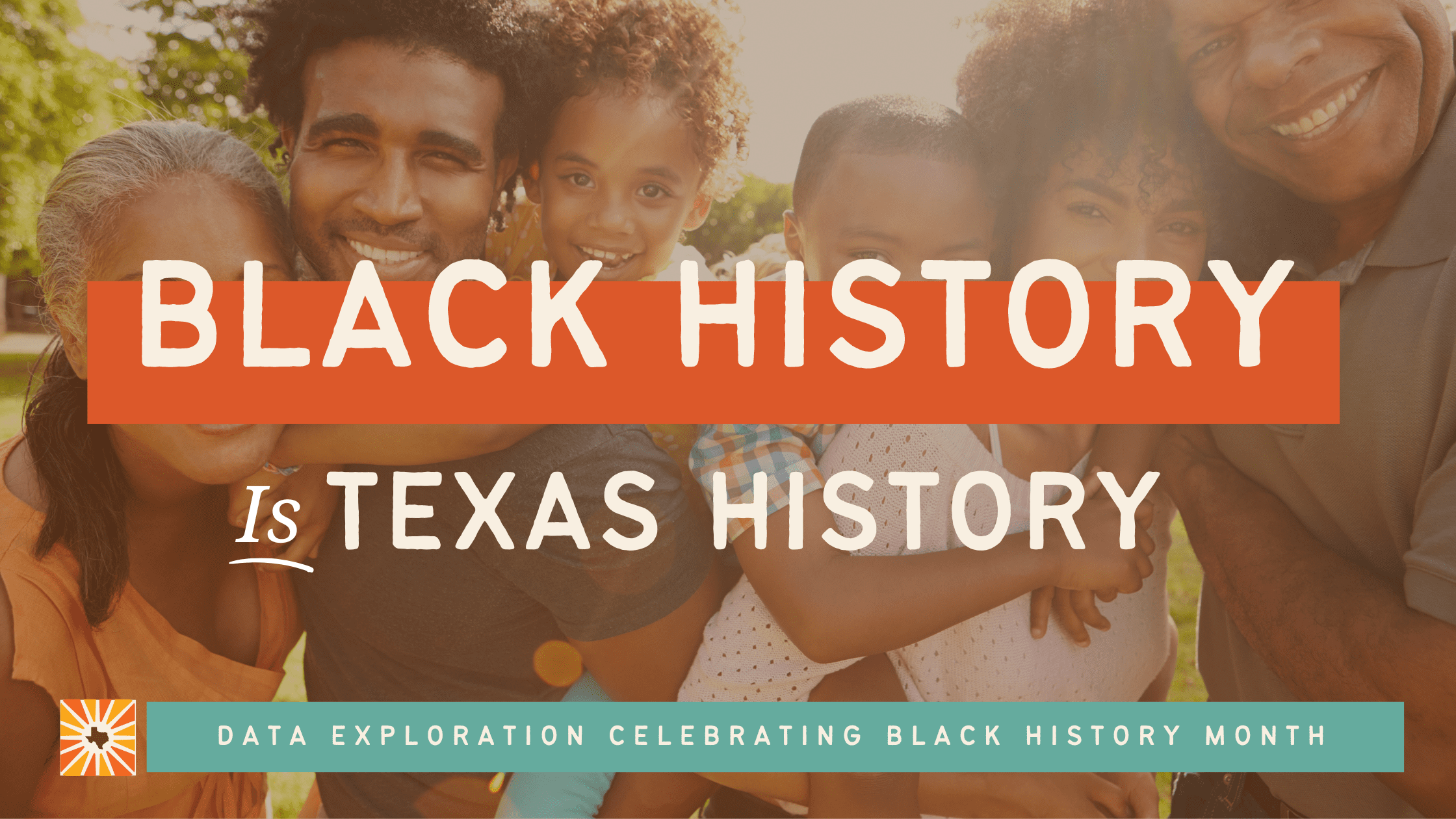Authored by Sarah Serpas and Kaitlan Wong
This Black History Month, we celebrated Black Texans across the state because Black history is Texas history. Explore our Storymap Data Brief on Black Texans and find a summary of our main findings below.
Black History Is Texas History.
On June 19, 1865, more than 250,000 enslaved Black Texans were finally informed that they were able to live freely. Following emancipation, Black Texans settled across the state. Although the Black population of Texas grew continuously over time, it faltered during times of restrictive and racist policies. During the Reconstruction Era, the Black population of Texas grew from 250,000 in 1870 to 690,000 in 1900, but this growth slowed during the Great Migration as many Black residents of the South fled restrictive Jim Crow laws and racial violence. As a state, we must acknowledge this part of our history and make policies to advance social justice for current and future Black Texans.
1 in 12 Texans identify as Black or African American.
In the latest 2022 American Community Survey Data, we find that:
- 3,552,579 residents of Texas identify as Black or African American. That’s roughly 1 out of every 12 Texans, and this number is growing. The Black population of Texas grew by 579,745 in the last decade. That’s a 20% increase between 2012 and 2022. By 2050, it is projected that there will be 6,030,795 Black people living in Texas.
- Texas has the largest Black population of any other state. Texas is home to 178,631 more Black residents than Georgia, the state with the second largest Black population. However, Texas only ranks 18th in the share of the Black population, with 12% of Texans identifying as Black compared to 31% of Georgians.
- Unsurprisingly, the greatest number of Black Texans are in the state’s most populous areas. The largest numbers of Black Texans live in Harris (893,000), Dallas (586,000), and Tarrant counties (365,000). Combined, these three counties make up more than half (51%) of the Black Texan population.

Black Texans are diverse.
Black Texans come from many different backgrounds. Some key findings:
- 6% of Black Texans are Hispanic or Latino. Of the 234,691 Black Texans who identify as Hispanic or Latino, 56% are Mexican, 15% are Puerto Rican, 5% are Dominican, 4% are Honduran, and 4% are Cuban.
- 9% of Black Texans (more than 300,000) were born outside of the United States to non-citizen parents. Of these Black Texans, 28% were born in Nigeria, 7% in Ethiopia, 5% in Kenya, and 5% in Cameroon.
- More than 365,000 Black Texans speak a language other than English at home. Of these individuals, 33% speak Spanish, 11% speak French, 10% speak Yoruba, and 7% speak Igbo. Overall, Black Texans speak at least 89 different languages.
- Black Texans mirror statewide trends in terms of age. The median age for Black Texans is 33.6 years while the overall median age in Texas is 35.2 years.
- More than 115,000 Black Texans are LGBTQ. The Williams Institute estimates that 11% of LGBT Texans are Black, and that 10,600 Black transgender adults live in Texas. We also found that while 8% of all coupled householders in Texas are Black, 19% of unmarried same-sex women couples are Black. It is important to note that LGBTQ populations are often undercounted.

Black Texans are entrepreneurs and changemakers, but economic and health disparities persist.
Not only is the population of Black Texans growing, but so are the numbers of Black Texans with advanced degrees and Black business owners. Some of our main findings are:
- Black women are leaders in higher education across the state. According to the Texas Women’s Foundation Economic Issues for Women in 2022, Black and Hispanic women are the primary contributors to women’s educational attainment advancement in Texas.
- 12% of Texas workers are Black, and 6% of Black workers are business owners. The Texas Labor force is composed of roughly 16 million Texans, more than 2 million of which are Black. A higher share of Black Texans work in the federal or state government compared to Texas workers overall. 132,000 Black Texans are self-employed and own their own businesses.
- Disparities persist in homeownership and wealth. Texas has the second largest number of Black homeowners of any state (556,000), second only to Georgia at 603,000. However, only 41% of Black households in Texas own their own homes, compared to 65% of white households.
- Systemic inequalities persist in health care. Black Texans are hardworking contributors to our state despite systemic inequities that are hurdles for many. In Texas, 15% of Black people lack health insurance compared to 10% of white people in the state.
- Inequities are even more pronounced for Black women. The median earnings for a Black woman (age 16+) working full time are $45,855, compared to $51,474 for a Black man. Furthermore, non-Hispanic white men make about twice as much as Black women, $78,104 to $57,937 respectively. Black women also disproportionately experience negative outcomes in maternal care that result in significant health consequences.
We all win when Black Texans thrive.
Texas needs policies that ensure equitable economic and well-being outcomes for all Texans. When Black Texans thrive, the entire state prospers.

